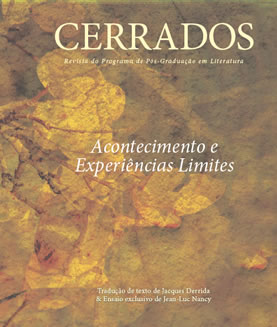Literature and the experience of the abyss
Keywords:
Abyss. Experience. Limit. Derrida. Aporia.Abstract
The binding of the modern subject to fragmentation, dispersion and the denial proposes a context in which the poet can be thought of as an explorer of the abyss of thought and language, making his art articulates with the potentiality of this space of essential solitude (as defined by Blanchot). In this way, since the “writing of the disaster”, the thought, by aestheticizing itself, produces a shattering of references and a language that is no longer able to demonstrate its original source. Thus, based on this negative tradition, this essay aims to discuss the relationship between trace (Spur and trace), absent foundation/void (Abgrund), breakthrough (frayage) and the aesthetic comprehension by living with the experience of the abyss that puts the literary language forward the aporia of thought.
Downloads
References
AGOSTINHO DE HIPONA. Confessions, v. 2: Books 9-13. Trans. by William Watts. Edição bilíngue. Cambridge/London: Harvard University Press; Loeb Classical Library, 2006.
ALIGHIERI, Dante. “Divina Commedia”. In: ______. Tutte le opere. Introduzione di Italo Borzi. Commenti a cura “di Giovanni Fallani, Nicola Maggi e Silvio Zennaro. Edizioni integrali. Roma: Newton Compton Editori, 2008.
ARTAUD, Antonin. “Artaud le Mômo”. In: ______. Oeuvres. Paris: Gallimard, 2004. (Collection Quarto).
BAUDELAIRE, Charles. Oeuvres complètes. Texte établie et annoté para Y.-G. Le Dantec. Paris: Gallimard, 1951. (Bibliothèque de la Pléiade).
BECKETT, Samuel. L’innommable. Paris: Minuit, 2004.
BLANCHOT, Maurice. La part du feu. Paris: Gallimard, 1984.
______. A parte do fogo. Trad. de Ana Maria Scherer. Rio de Janeiro: Rocco, 1997.
______. L’espace littéraire. Paris: Gallimard, 2003.
______. L’écriture du désastre. Paris: Gallimard, 2006.
CAMPOS, Haroldo de. A Ilíada de Homero. Edição bilíngue. São Paulo: Arx, 2002, 2 v.
CELAN, Paul. “Zeitgehöft”. In: ______. Die Gedichte: Kommentierte Gesamtausgabe. Frankfurt a.M.: Suhrkamp Verlag, 2005.
DERRIDA, Jacques. L’autre cap. Paris: Minuit, 1991.
______. Donner le temps 1. La fausse monnaie. Paris: Galilée, 1991.
______. Donner la mort. Paris: Galilée, 1999.
______. Paixões. Campinas: Papirus, 1995.
______. Apories: mourir ”“ s’attendre aux «limites de la vérité». Paris: Galilée, 1996.
______. Anne Dufourmantelle convida Jacques Derrida a falar da hospitalidade. São Paulo: Escuta, 2003.
______. Béliers: le dialogue ininterrompu: entre deux infinis, le poème. Paris: Galilée, 2003.
FOUCAULT, Michel. História da sexualidade 3: o cuidado de si. 8ª ed. Rio de Janeiro: Graal, 2005.
GROSSMAN, Evelyne. L’angoisse de penser. Paris: Minuit, 2008.
HEIDEGGER, Martin. A caminho da linguagem. Petrópolis, RJ: Vozes; Bragança Paulista, SP: Ed. Univ. São Francisco, 2003.
HERÓDOTO. História. 2ª ed. Brasília: EdUnB, 1988.
KAFKA, Franz. Der Aufbruch. Disponível em: <http://www.textlog.de/cgi-bin/search/proxy.cgi?terms=Der%20Aufbruch&url=http%3A%2F%2Fwww.textlog.de%2F32080.html>. Acesso em: 20 nov. 2011.
______. Narrativas do espólio (1914-1924). Trad. de Modesto Carone. São Paulo: Companhia das Letras, 2002.
KANT, Immanuel. Crítica da faculdade do juízo. 2ª ed. Rio de Janeiro: Forense Universitária, 2008.
KOFMAN, Sarah. Comment s’en sortir? Paris: Galilée, 1983.
LYOTARD, Jean-François. Lições sobre a analítica do sublime. Campinas: Papirus, 1993.
MALLARMÉ, Stéphane. Un coup de Dés jamais n’abolira le Hasard. Manuscrit et épreuves. Édition et obsérvations de Françoise Morel. Ed. fac-similar. Paris: La Table Ronde, 2007.
MONTAIGNE, Michel de. Essais ”“ Livre II. Paris: Garnier-Flammarion, 1979.
______. Ensaios. Trad. de Sérgio Milliet. São Paulo: Abril Cultural, 1972.
______. Os ensaios ”“ Livro II. 2ª ed. Trad. de Rosemary Costhek Araújo. São Paulo: Martins Fontes, 2006.
______. Os ensaios: uma seleção. Trad. de Rosa Freire d’Aguiar. São Paulo: Companhia das Letras, 2010.
NANCY, Jean-Luc. Résistance de la poésie. Périgueux: William Blake & Co., 2004.
NIETZSCHE, Friedrich. O nascimento da tragédia ou Helenismo e pessimismo. Trad. de J. Guinsburg. São Paulo: Companhia das Letras, 1998.
______. Die Geburt der Tragödie / Unzeitgemäße Betrachtungen I-IV / Nachgelasssene Schriften 1870-1873. Sämtliche Werke Kritische Studienausgabe in 15 Baden. Herausgegeben von Giorgio Colli und Mazzino Montinari. München: de Gruyter, 1999, KSA 1.
______. Der Fall Wagner; Götzen-Dämmerung; Der Antichrist; Ecce homo; Dionysos-Dithyramben; Nietzsche contra Wagner. Sämtliche Werke Kritische Studienausgabe in 15 Baden. Herausgegeben von Giorgio Colli und Mazzino Montinari. München: de Gruyter, 1999, KSA 6.
NOBRE ALCORÃO. Trad. de Helmi Sasr. Com a colaboração da Liga Islâmica Mundial, em Makkah Nobre. Complexo do Rei Fahd/Al-Madinah Al-Munauarah K.S.A., Suratu 37, v. 102.
PASCAL, Blaise. «Pensée». In: ______. L’Oeuvre. Texte établie et annoté para Jacques Chevalier. Paris: Gallimard, 1936. (Bibliothèque de la Pléiade).
______. Pensamentos. Trad. de Sergio Milliet. São Paulo: Nova Cultural, 1973. (Coleção “Os Pensadores”).
PLATÃO. “Ãon”. In: ______. Diálogos: Critão, Menão, Hípias e outros. Belém: UFPA, 2007.
SHAKESPEARE, William. “King Lear”. In: GREENBLATT, S.; COHEN, W.; HOWARD, J.; MAUS, K. E. (org.). The Norton Shakespeare: based on the Oxford Edition. 2ª ed. London: WW Norton & Company, 1997.
VALÉRY, Paul. Monsieur Teste. Paris: Gallimard, 2008.
______. Poésies. Paris: Gallimard, 2010.
WITTGENSTEIN, Ludwig. Tratado lógico-filosófico / Investigações filosóficas. 2ª ed. Lisboa: Fundação Calouste Gulbenkian, 1995.
Downloads
Published
How to Cite
Issue
Section
License
Proibida a reprodução parcial ou integral desta obra, por qualquer meio eletrônico, mecânico, inclusive por processo xerográfico, sem permissão expressa do editor (Lei n. 9.610 de 19/2/1998 )



